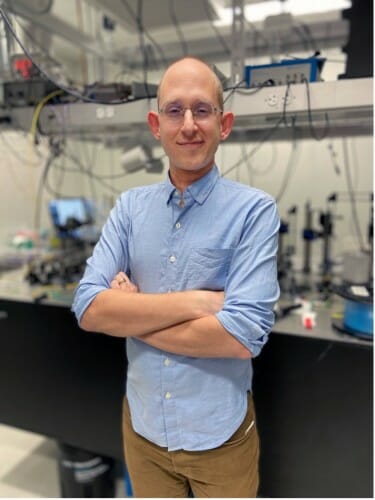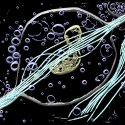Chemist Randall Goldsmith named a Schmidt Science Polymath
Randall Goldsmith likens the work he does — measuring the characteristics and behavior of single chemical molecules — to listening to a group of 100 people in a room together, simultaneously belting out “On, Wisconsin!”
Everything’s fine, the University of Wisconsin–Madison chemistry professor explains, until a few people start to slide out of rhythm or key. Or, worse, start singing a different song altogether.
“This is the situation in most types of chemical measurement,” says Goldsmith, the Lester R. McNall Professor of Chemistry. “But by making our measurements one molecule (and thus one song) at a time, we can make out all of that fascinating detail on molecular dynamics. If we see what molecules are doing, then we can open up paths to improve their performance.”

Chemistry professor Randall Goldsmith’s lab collaborates with UW–Madison colleagues in disciplines including engineering, physics and biology. Submitted photo
His approach to studying chemical and biophysical systems has caught the attention of Schmidt Futures — an initiative founded by former Google CEO Eric Schmidt and his wife, investor and philanthropist Wendy Schmidt — which named Goldsmith one of its 2022 Schmidt Science Polymaths award winners. Each of the 10 recipients, who are newly tenured university faculty chosen for their promising interdisciplinary research, receives $2.5 million over five years to help fund their research groups.
“Support from the Schmidt Futures organization is transformational,” says Goldsmith. “Multidisciplinary ideas are naturally risky because they just have more moving parts. They need new equipment, new materials, new collaborators. Most importantly, they need time for my team to learn new scientific languages, time for us to become experts in new areas, and just overall time for the science to evolve and mature. Being a Schmidt Polymath allows all of this to happen.”
Goldsmith’s lab collaborates with UW–Madison colleagues in disciplines including engineering, physics and biology, constructing nanophotonic devices, employing molecular spectroscopy, and exploiting quantum processes to focus on single molecules. Goldsmith’s own research uses the single-molecule perspective to improve the design of critical chemical reactions for the pharmaceutical and fuel industries.
“Single-minded specialization coupled with rigid research and funding structures often hinder the ambition to unleash fresh perspectives in scientific inquiry,” says Stuart Feldman, chief scientist of Schmidt Futures. “From climate change to public health, the Schmidt Science Polymaths utilize the depth of their knowledge across a breadth of fields to find new ways to solve some of our hardest problems for public benefit.”
Hopeful Polymaths from more than 25 universities submitted applications outlining research ideas in STEM fields that represent a substantive shift from their current research portfolio and are unlikely to receive funding elsewhere. Goldsmith is the first UW–Madison professor to win a Polymath Award.
“We’ve always had so many more ideas than we’ve had time and resources to pursue,” Goldsmith says. “One major focus we’re looking to pursue is making new photonic structures — three-dimensional devices that can bend and control light in really unusual ways. We also have ideas for new forms of biological microscopy.”
To learn more about the Schmidt Science Polymath Program, visit schmidtfutures.com.
Tags: chemistry, faculty awards, research



